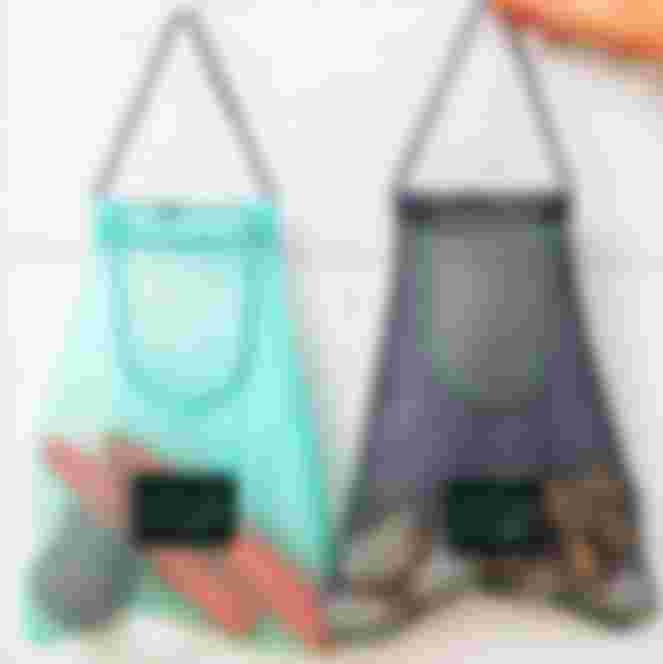Some eco-friendly alternatives to plastic as everyday bags.
The use of plastic in our daily work is significant. Our life is unimaginable without plastic. In almost all cases we use plastic. And this use is increasing every day. Plastic is undoubtedly harmful to the environment. Knowing that, we are not stopping its use. The easy availability and low cost of plastic has led us to a habit.
2 million plastic bags are used every minute in the world, which is between 500 billion and 1 trillion annually. Of that, 23 billion is in New York City alone. This plastic has caused the deaths of 1.1 million birds and animals living on the world's seas. It is estimated that about 90% of the world's birds and fish have plastic micro-particles in their bodies.
The average usage time of a plastic bag is only 12 minutes! This has led to a massive waste of Earth's resources and a variety of adverse conditions, including the catastrophic consequences for the planet from plastic bags. To change this situation, we urgently need to consider the alternative use of plastic bags.
Governments in many countries around the world have banned plastic bags. Some countries are planning to ban it again. It is not easy to deny that we have become so accustomed to using these bags over the years that we cannot imagine our daily lives without them. Uncontrolled distribution of free plastic bags is taking place in markets or stores. We consumers have also become accustomed to using it. One of the major causes of environmental pollution is the use of so many plastic bags.
The world is already on the brink of an environmental catastrophe. In the early 1950's alone, about 6.3 billion tons of plastic were produced worldwide. Half of this amount has been produced in the last 15 years. By 2050, that number is expected to double. Every year, about 6 million plastic products are dumped into the beaches of coastal countries, which is severely damaging the ecosystem there
The alternative use of plastic bags is very sensitive and its change is also time consuming. This article will discuss the most relevant and best alternatives to plastic bags. Hopefully, we will be able to choose the right option of plastic bags, which will contribute to the environment as well as ease of use.
1. Recyclable paper bags
Unlike plastic, paper bags are recyclable. Paper bags rot faster than plastic bags. It takes about twenty to thirty years for a plastic bag to break down! Some scientists say that it can last up to 200 years. Yet it does not just disappear, it only becomes small pieces, which later adversely affects the oceans, fish and wildlife. More alarmingly, microplastics are now found in food and water.

Paper bags take only a month to decompose. Paper bags are made from trees, and it is considered environmentally friendly because trees are a renewable source. Paper bags reduce the risk of suffocation in animals and children more than plastic bags. Although it is more expensive to buy paper bags than plastic bags, it is important for us to make the right decision considering the environment and the future.
2. Reusable foldable shopping bags
Mesh or mesh bags are another alternative to plastic bags. This bag is flexible, light, and convenient for carrying heavy luggage. Its elasticity can be extended according to the purchase. It's a fashionable, functional, durable, and reusable bag.
3.Reusable cotton tote bag
Cotton shopping bags are thick and stiff. The strength of a single cotton shopping bag is greater than that of a paper or plastic bag. These bags are the most fashionable bags that can be used while shopping. These bags are now available in different designs due to their popularity. Strong enough and lasts for many years. Cotton tote bags are quite strong and durable.

4.Canvas bag
Canvas bags are also made of cotton. However, compared to cotton bags, canvas bags are lighter in weight and more affordable. These can be of different sizes, and are more durable. These bags can also be washed and used many times. Canvas bags are cheaper and more perishable than conventional plastic bags. So this bag is also a good alternative to plastic bags. Almost in the age of free learning, these bags can be made at home knowing the rules.

5.Water hyacinth or water hyacinth bag
Water hyacinth or water hyacinth is an aquatic plant that contains fiber. It is used to make various things including bags. It is used to make fiber bags which serve as an excellent alternative to plastic. It is biodegradable, that is, it can be mixed with soil. It can be used to make bioplastics because it contains a large amount of carbohydrates. But these bags will be quite expensive, but in some cases it can cost money considering the environment.

6. Crochet bag made of yarn or wool
These are easy to make and cheap. These crochet bags are made with some wool or different types of eco-friendly yarn and a crochet needle. A crochet hook is a type of needle or hook that can be used to make a bag or cloth using yarn or wool. These bags are beautiful to look at and also suitable for the environment. But the availability and excessive use of polythene bags has put a damper on the demand for crochet bags. If the ban on polythene bags is enforced, this innovative industry will be revived.pic.
7. Jute bags
Jute bags are probably the oldest and most powerful alternative to plastic bags. Like cotton bags, jute is also naturally renewable. These bags are eco-friendly and easily biodegradable. Even before making bags, jute plants do a lot of good for the environment by purifying carbon.

8. Alternatives to plastic cups and spoons
We see thin plastic tea cups in tea shops, which are used all the time. These cups are as harmful to the environment as they are to the human body. With tea, tiny microplastics enter our bodies. So as an alternative we can use some cups that are eco-friendly, durable, and can be eaten after use if the user wants. Yes, it is possible. It can also be used as an alternative to plastic spoons, which can be eaten with food.


9. Vegetable bags or packets
Such eco-friendly bags or packets are made by processing unnecessary parts of different types of grains or plants. It can be used as an alternative to plastic. It is especially used in food packaging. They are made from unnecessary parts of sugarcane or coconut husk, corn or wheat.

10. Things made of bamboo or wood.
Accessories made of bamboo or wood can be an alternative to plastic. These items are safe for the environment, comfortable to use and have a sense of fancy.








These are great substitutes for plastics. Whenever we go to the mall, we always brought our own eco bag to lessen the plastics that will be used. Here in Philippines, there are lots of eco friendly bags especially bags that are made from abaka which is famous in here. I hope that people will stop using plastic and instead, they'll use these amazing eco friendly things.